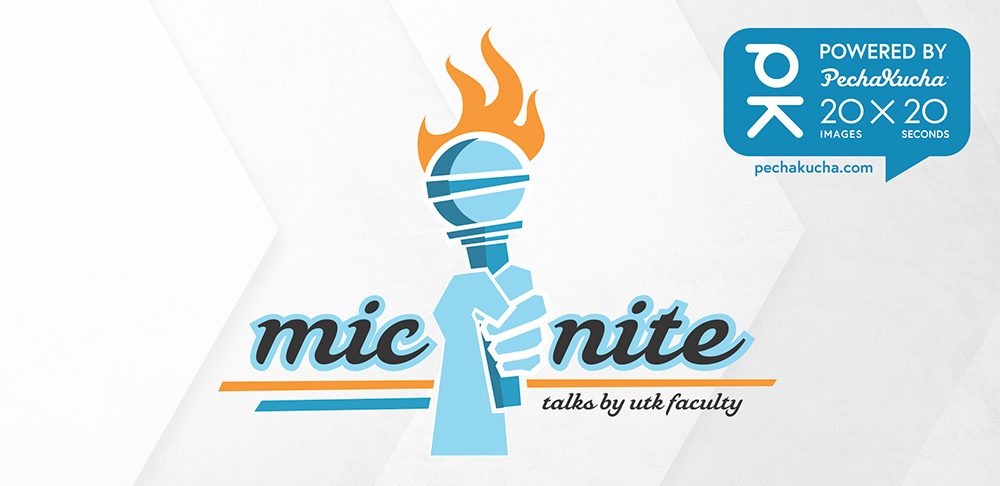Next Event: Thurs, Mar. 19
RSVP will open Feb. 15, 2026. For more details, visit the Mic/Nite site on the UTK Employee Hub.
Log in for more info
Twice a year, the Office of the Provost hosts Mic/Nite, a “Pecha-Kucha Powered” social gathering designed to enhance the intellectual, interdisciplinary, and cultural life of the faculty and staff at UT Knoxville.
One of the challenges in a large university community is working across the silos that often separate disciplines. Mic/Nite offers an opportunity to build bridges and foster a deeper appreciation of the many facets of a large, comprehensive university. Presentations offer a cross section of the intellectual life of UT Knoxville and provide an opportunity for social interaction among faculty and staff who may not otherwise have the opportunity to interact with each other.
See Spring 2026 presenters and topics
Who Can Attend
UT Mic/Nite is an event for UT faculty and staff (and their guests) and is not open to students or the general public.
What is Pecha-Kucha?
Pecha-Kucha is a simple presentation format that features twenty images displayed for twenty seconds each. The images automatically forward as the presenter talks. To learn more, visit the Pecha-Kucha FAQ. Samples are posted on the Pecha-Kucha Presentations page.
The format originated in Tokyo, Japan. It was first introduced in 2003 and has spread to more than 400 cities around the world. The format allows presenters to depict and describe everything from urban design or economic theory to a series of photographs. Mic/Nite is held in cooperation with PechaKucha Night Knoxville, which was started in 2011 to encourage intellectual and cultural dialogue. Mic/Nites are special interdisciplinary events that facilitate dialogue between university faculty and staff by showcasing the academic pursuits of the campus.
Explore Pecha Kucha events from around the world: PechaKucha 20×20 – Official Site | PechaKucha 20×20 – Knoxville | PechaKucha 20×20 – FAQ
Spring 2026 Presenters and Topics
Empowerment Beyond the Clinic: Rethinking Diabetes Care
Samereh Abdoli, Associate Professor, Nursing
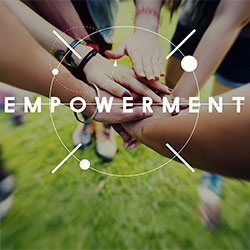 Diabetes empowerment has long been a central goal of diabetes care, emphasizing education, self-management, and individual responsibility. My work began by examining empowerment in the context of stigmatization and discrimination experienced by individuals living with diabetes in Iran and later expanded to explore diabetes burnout in the United States. Over time, this trajectory revealed a critical insight: empowerment efforts often falter when they fail to account for the social and structural realities shaping daily diabetes management. This presentation reflects on how diabetes care must move beyond the clinic to address root causes such as social determinants of health, including food insecurity, access barriers, and chronic stress. By reframing empowerment as a shared responsibility between individuals, healthcare systems, and communities, this work calls for more holistic, context-aware approaches to improving diabetes care. Ultimately, meaningful empowerment requires not only knowledge and motivation, but also access, dignity, and structural support that enable people to manage diabetes in their lived environments.
Diabetes empowerment has long been a central goal of diabetes care, emphasizing education, self-management, and individual responsibility. My work began by examining empowerment in the context of stigmatization and discrimination experienced by individuals living with diabetes in Iran and later expanded to explore diabetes burnout in the United States. Over time, this trajectory revealed a critical insight: empowerment efforts often falter when they fail to account for the social and structural realities shaping daily diabetes management. This presentation reflects on how diabetes care must move beyond the clinic to address root causes such as social determinants of health, including food insecurity, access barriers, and chronic stress. By reframing empowerment as a shared responsibility between individuals, healthcare systems, and communities, this work calls for more holistic, context-aware approaches to improving diabetes care. Ultimately, meaningful empowerment requires not only knowledge and motivation, but also access, dignity, and structural support that enable people to manage diabetes in their lived environments.
Shoot for the Moon: Mastering Practice with Purpose through the Intentional Practice Journal
Maria Castillo, Assistant Professor, Natalie L. Haslam College of Music
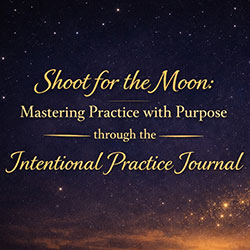 This presentation introduces the Intentional Practice Journal as a pedagogical tool that supports reflective, goal-oriented practice in higher education music settings. Grounded in principles of self-regulated learning and metacognition, the journal reframes practice as an intentional, process-driven activity rather than a purely time-based routine.
This presentation introduces the Intentional Practice Journal as a pedagogical tool that supports reflective, goal-oriented practice in higher education music settings. Grounded in principles of self-regulated learning and metacognition, the journal reframes practice as an intentional, process-driven activity rather than a purely time-based routine.
The session demonstrates how structured daily, weekly, and long-term goal setting helps students practice with greater clarity, efficiency, and adaptability. Guided prompts for planning, reflection, and progress tracking encourage students to articulate challenges, evaluate outcomes, and connect technical work to broader musical goals.
The presentation also addresses student motivation and identity through reflective writing and aspiration-setting, aligned with the philosophy: “Shoot for the moon—even if you miss, you’ll land among the stars.” Attendees will leave with practical strategies for integrating the journal into applied teaching, coursework, or ensemble contexts to foster focused, sustainable practice habits.
Navigating Barriers to Mental Health in Schools
Robert Lucio, Associate Professor, Social Work
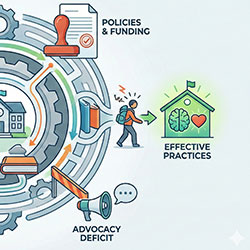 Despite the need for comprehensive school mental health services, a persistent research-to-practice gap hinders effective implementation. This scholarship examines the multifaceted barriers that prevent school social workers from realizing the full potential of their role as school mental health leaders. These barriers include inconsistent certification requirements, preparation, and role ambiguity, which can vary from state to state or even district to district. Research identifies the need for school-specific knowledge and interventions, yet training and language also vary. Professional and funding silos further complicate services. Finally, a deficit in sustained professional advocacy limits school social workers’ systemic influence in legislative and policy spaces. Deconstructing these barriers, specifically certification, research gaps, policy constraints, and advocacy, provides a roadmap for moving beyond surface-level implementation to systemic solutions.
Despite the need for comprehensive school mental health services, a persistent research-to-practice gap hinders effective implementation. This scholarship examines the multifaceted barriers that prevent school social workers from realizing the full potential of their role as school mental health leaders. These barriers include inconsistent certification requirements, preparation, and role ambiguity, which can vary from state to state or even district to district. Research identifies the need for school-specific knowledge and interventions, yet training and language also vary. Professional and funding silos further complicate services. Finally, a deficit in sustained professional advocacy limits school social workers’ systemic influence in legislative and policy spaces. Deconstructing these barriers, specifically certification, research gaps, policy constraints, and advocacy, provides a roadmap for moving beyond surface-level implementation to systemic solutions.
Increasing Accountability and Compliance with Robot Advice
Stephanie Noble, Professor, Haslam College of Business
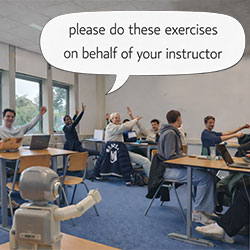 Service robots on organizational frontlines, notably in health and elderly care settings, promise to tackle staff shortages. In such service contexts, compliance is crucial for consumer well-being, but compliance with robot advice remains problematically low. This research explores how the source of robot advice affects compliance in human-robot interactions. In six studies, including four field studies with real human-robot interactions, the authors demonstrate that consumers are more likely to comply with advice given by a robot service provider when the source of advice is a human rather than the robot itself. This is because a human source of robot advice increases the feeling of accountability, or the expectation that one might need to justify one’s actions to others, which is more difficult to achieve with only robot social presence. In turn, this fosters advice adherence, which also persists over time across repeated interactions.
Service robots on organizational frontlines, notably in health and elderly care settings, promise to tackle staff shortages. In such service contexts, compliance is crucial for consumer well-being, but compliance with robot advice remains problematically low. This research explores how the source of robot advice affects compliance in human-robot interactions. In six studies, including four field studies with real human-robot interactions, the authors demonstrate that consumers are more likely to comply with advice given by a robot service provider when the source of advice is a human rather than the robot itself. This is because a human source of robot advice increases the feeling of accountability, or the expectation that one might need to justify one’s actions to others, which is more difficult to achieve with only robot social presence. In turn, this fosters advice adherence, which also persists over time across repeated interactions.
Strengthening Cybersecurity in the Age of AI Threats
Nick Nugent, Assistant Professor, Winston College of Law
 Artificial intelligence is transforming cybersecurity on both sides of the conflict. Generative and agentic AI systems enable attackers to discover vulnerabilities, automate intrusions, and conduct highly effective social engineering attacks at unprecedented scale, while also introducing novel vulnerabilities that make AI systems themselves targets. Yet core cybersecurity doctrines—from trespass and computer misuse statutes to fraud, impersonation, and negligence—remain anchored to outdated assumptions about human actors, discrete intrusions, and static tools. This presentation shows the principal ways AI intersects with cybersecurity and provides a roadmap for strengthening cybersecurity law in the new age of AI threats.
Artificial intelligence is transforming cybersecurity on both sides of the conflict. Generative and agentic AI systems enable attackers to discover vulnerabilities, automate intrusions, and conduct highly effective social engineering attacks at unprecedented scale, while also introducing novel vulnerabilities that make AI systems themselves targets. Yet core cybersecurity doctrines—from trespass and computer misuse statutes to fraud, impersonation, and negligence—remain anchored to outdated assumptions about human actors, discrete intrusions, and static tools. This presentation shows the principal ways AI intersects with cybersecurity and provides a roadmap for strengthening cybersecurity law in the new age of AI threats.
The Mechanized Landscape: Statecraft and Environment in Tennessee Valley
Micah Rutenberg, Assistant Professor, Architecture & Design
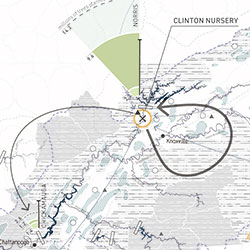 What does it mean to design and plan a region? How do technology, infrastructure, and environment converge in the making of a designed landscape?
What does it mean to design and plan a region? How do technology, infrastructure, and environment converge in the making of a designed landscape?
The Tennessee Valley Authority (TVA), established by the United States government in 1933 as a New Deal-era public works agency, was tasked with overseeing the Tennessee River watershed—a newly defined region marked by natural rather than political boundaries. Charged with planning, developing, and managing the watershed’s natural resources, the TVA also sought to modernize infrastructure and daily life throughout the region. Within its first two decades, the TVA fundamentally transformed both the physical and social fabric of the Tennessee Valley.
The Mechanized Landscape is a research project and recently published book (Applied Research + Design Publishing, 2025) that examines the significance and impact of the TVA in its early phases (1933–1953). Drawing on archival research, original photographs, and newly created maps, this work traces the geospatial history of a designed region.
Brain-Inspired Computing: Opportunities for Neuromorphic Systems in the Future of Computing
Catherine Schuman, Assistant Professor, Tickle College of Engineering
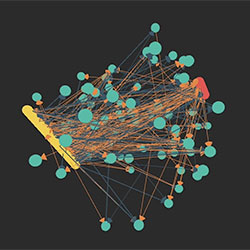 Neuromorphic computing, a brain-inspired computing technology, provides the opportunity for low-power, intelligent computing systems. Neuromorphic computers have the potential to be used in a variety of scenarios, from the edge to high-performance computing systems. In this talk, I will overview the field of neuromorphic computing, and I will give an introduction to spiking neural networks, as well as some of the most common algorithms used in the field. Finally, I will discuss the potential for using neuromorphic systems in real-world applications from scientific data analysis to autonomous vehicles.
Neuromorphic computing, a brain-inspired computing technology, provides the opportunity for low-power, intelligent computing systems. Neuromorphic computers have the potential to be used in a variety of scenarios, from the edge to high-performance computing systems. In this talk, I will overview the field of neuromorphic computing, and I will give an introduction to spiking neural networks, as well as some of the most common algorithms used in the field. Finally, I will discuss the potential for using neuromorphic systems in real-world applications from scientific data analysis to autonomous vehicles.
Why Plants Matter and the Power of Active Observation
Jacob Suissa, Assistant Professor, Arts and Sciences
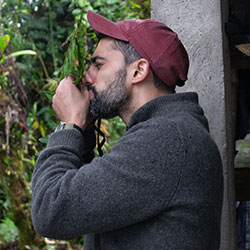 We are terrestrial animals living in a world that is largely shaped and maintained by plants. There are more grasses than birds, more mints than mammals, more beans than butterflies. Roughly 82% of all living stuff on earth (biomass) are plants. They provide the raw materials for our homes and clothes, the food we eat, and the oxygen we breath. Without plants, life as we know it could not exist. Learning more about plants, whether at the frontiers of scientific research or as an amateur enthusiast, is not random or frivolous but rather an effort to better understand the context of our own human lives.
We are terrestrial animals living in a world that is largely shaped and maintained by plants. There are more grasses than birds, more mints than mammals, more beans than butterflies. Roughly 82% of all living stuff on earth (biomass) are plants. They provide the raw materials for our homes and clothes, the food we eat, and the oxygen we breath. Without plants, life as we know it could not exist. Learning more about plants, whether at the frontiers of scientific research or as an amateur enthusiast, is not random or frivolous but rather an effort to better understand the context of our own human lives.
Care, RADICALLY
Jessie Wilkerson, Associate Professor, Arts and Sciences
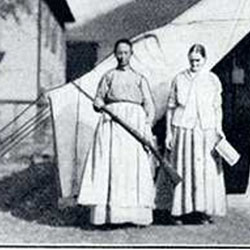 In 1912, labor activist Sarah Blizzard joined with dozens of other women and men in southern West Virginia to confront the private police forces that sought to destroy miners’ attempts to unionize. Known as the Paint Creek and Cabin Creek Strike, it soon turned into a struggle over civil liberties and set off what is now known as the “Mine Wars” in Appalachia–a series of strikes and confrontations over a decade that laid the foundations of the modern labor movement. This presentation turns to the stories of the women like Blizzard, who sustained the strike and enabled one of the most historic mass uprisings of American workers, launching Appalachia’s reputation as a site of protest.
In 1912, labor activist Sarah Blizzard joined with dozens of other women and men in southern West Virginia to confront the private police forces that sought to destroy miners’ attempts to unionize. Known as the Paint Creek and Cabin Creek Strike, it soon turned into a struggle over civil liberties and set off what is now known as the “Mine Wars” in Appalachia–a series of strikes and confrontations over a decade that laid the foundations of the modern labor movement. This presentation turns to the stories of the women like Blizzard, who sustained the strike and enabled one of the most historic mass uprisings of American workers, launching Appalachia’s reputation as a site of protest.
Image credit: A Cabin Creek riflewoman on Guard before her tent. Coal Age Magazine
You Are Where You Live: The Role of Third Places in the Lives of Young People
Alexander Wray, Assistant Professor, Education Health & Human Sciences
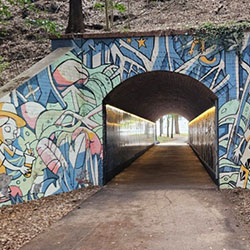 Youth in the US spend approximately 20% of their time in school, and 40% of their time at home sleeping. That leaves 40% of their waking hours where they can choose how to spend their time. However, since the 1990s, time spent in places outside of home, school, or highly supervised activities has declined to near zero. Today’s youth have almost no independent presence in public life. While it may be easy to blame social media or overprotective parents, there is a deeper issue. America’s neighborhoods have drastically changed in the last 30 years. The opportunity structures, like arcades, diners, malls, and parks for young people to play and socialize have disappeared from most neighborhoods. The lack of these opportunity structures is having a profound impact on the formation of health-related behaviors on young people, which may have a catastrophic impact on America’s health in the decades to come.
Youth in the US spend approximately 20% of their time in school, and 40% of their time at home sleeping. That leaves 40% of their waking hours where they can choose how to spend their time. However, since the 1990s, time spent in places outside of home, school, or highly supervised activities has declined to near zero. Today’s youth have almost no independent presence in public life. While it may be easy to blame social media or overprotective parents, there is a deeper issue. America’s neighborhoods have drastically changed in the last 30 years. The opportunity structures, like arcades, diners, malls, and parks for young people to play and socialize have disappeared from most neighborhoods. The lack of these opportunity structures is having a profound impact on the formation of health-related behaviors on young people, which may have a catastrophic impact on America’s health in the decades to come.
Do We Own What We “Buy”? Rethinking Ownership in the Age of Digital Media
Awa Zhu, Associate Professor, Communication and Information
 What does it mean to “own” a copy of a digital book, song, movie, or game? When we click “Buy Now,” are we purchasing a product—or merely renting access under someone else’s rules? This talk explores how digital media challenges our assumptions about ownership. Platforms like Amazon, Apple, and Spotify rely on legal contracts, invisible code, and shifting norms to redefine our rights in the digital world. Drawing on interdisciplinary research, I examine how user expectations, platform policies, and embedded technical restrictions often collide. What we find is a digital ecosystem in flux, where convenience, control, and consumer rights do not always align. This talk invites us to reconsider what ownership means when information lives in the cloud and rights are subject to change without notice.
What does it mean to “own” a copy of a digital book, song, movie, or game? When we click “Buy Now,” are we purchasing a product—or merely renting access under someone else’s rules? This talk explores how digital media challenges our assumptions about ownership. Platforms like Amazon, Apple, and Spotify rely on legal contracts, invisible code, and shifting norms to redefine our rights in the digital world. Drawing on interdisciplinary research, I examine how user expectations, platform policies, and embedded technical restrictions often collide. What we find is a digital ecosystem in flux, where convenience, control, and consumer rights do not always align. This talk invites us to reconsider what ownership means when information lives in the cloud and rights are subject to change without notice.
